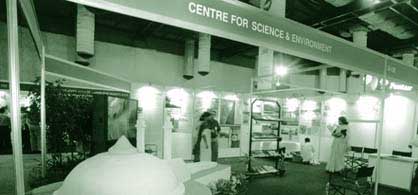
Vol. 2
No.
5
October 2000
|

Water Asia 2000 –
CSE’s stall on water harvesting
Water Asia 2000: Yet another effort of CSE to
sensitise people regarding the potential of water harvesting
Water Asia 2000 was organised in New Delhi between 18th and 20th of
September. The Centre for Science and Environment (CSE) was the only NGO to participate.
Apart from India were participants from Japan, US, Italy and several other countries.
While all the other participants exhibited technologies for water treatment, wastewater
treatment, pumps, valves, pipes, and heavy duty machinery, CSE’s stall was unique. It
emphasised on the need and potential of water harvesting. Both in rural and urban areas.
Centrally located, the stall displayed several panels pertaining to rural and urban water
harvesting. One of the panels exhorted communities to think: water problems? Don’t
look down, look up, basically exhorting people to tap rainwater. Three water-related films
– one on pollution in the river Yamuna, one on the revival of the Arvari river in
Alwar district of Rajasthan and one entitled ‘Water Works India,’ based on four
water harvesters were shown through the day.
In spite of the fact that the exhibition centered around technology and hardware,
several visitors thronged the stall. These included business persons, professionals,
students and others. Given below are some of the comments by the visitors.
| You should create awareness amongst
children also through publications, audiovisuals and games – S K Jain, Jaipur Most
informative stall – A Seshadri, SULABH, New Delhi
Interested to be involved –
S K Singh, Delhi College of Engineering, New Delhi
Keep it up – A K Sharma, New Delhi
Good show – S Srivastava, New Delhi
The depiction of subject matter is
impressive. The costs of the publications are however quite high – Rajiv Garg, Delhi Jal Board, New Delhi
Very interesting stall, the video
presentations are very informative – Santiago
Rodrigues, Spain Embassy, New Delhi
Good, educatuive, analytical effort by
CSE – G S Sidhu, Chandigarh
Good information on rainwater harvesting
– A K Nehera, PHED, Madhya Pradesh
Its nice to see an NGO amongst all the
companies – Kartikya Sarabhai, Centre for
Environment Education, Ahmedabad
Impressive – as always –
Embassy of Sweden
Excellent stall - S Prakasam,
Gobi Press, Sivakasi
Informative as always. Keep up the good
work – UNICEF, New Delhi
It will be great if more and more
people are educated on the need and methods to conserve water through efforts like these
– D Sridhar, MLA, Andhra Pradesh
An excellent show to help people (from
laypersons to experts) understand the basics of rainwater harvesting, from principles to
actual implementation – D Pitaliya, Pitaliya
Watertech Industries, Sangli |
Water
empowers women
Self-Employed Women’s Association (SEWA), an Ahmedabad based
organisation has launched a water campaign in Gujarat to empower women, the primary user
group, to demand a safe and sustainable water supply at the village level. The campaign
works towards integrating the three Ws — women, water and work. Mobilising women to
manage local water resources has made this possible, resulting in enhancing income levels
and creating new economic opportunities.
As part of SEWA’s water campaign, women have successfully
constructed plastic-lined pond and rooftop water harvesting tanks in a number of arid
villages. Efforts have been also made towards implementing watershed development measures
to conserve water. Unused wells are being repaired, tanks de-silted and checkdams
constructed. Women have formed water committees and set up water funds for the maintenance
of water structures. There have been instances where women have been trained as
‘barefoot technicians’ to repair and maintain handpumps.
The impact of SEWA’s intervention is apparent with the transformation in the
socio-economic conditions of the villages. Apart from developing water sources at the
village level, women have largely benefited from the employment opportunities generated at
the local level. Women have been employed in artisan work, handicrafts, gum collection and
salt manufacture in naturally hostile terrains. Productivity levels have increased, which
in turn has led to enhanced incomes and increased savings. The other benefits of this
water initiative have been exemplified in form of improved women’s health, which
normally is the lowest in the priority; safe motherhood; safe childbirth; lower infant
mortality; increased social security for woman and child; and, most importantly, reduced
migration during the lean season. Augmentation of water sources has also ensured food and
fodder security.
SEWA’s is an example of what the collective strength of women can achieve. In
order to replicate this example and to deal with water there is a need to integrate the
requirements of the stakeholders, facilitate capital formation, build capacities of women
organisations and promote social security.
For further information
Reema Nanavaty, Self-Employed
Women’s Association,
Opposite Lok Manya Tilak Baug, Bhadra,
Ahmedabad – 380 001
Tel: 6506444, 5506491, 5506447, 5507365
Email: sewamahila@wilnetonline.net |